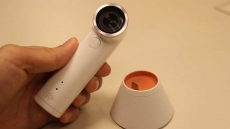Young Mexican researchers working at a government-run laboratory have developed three low-cost, life-saving technologies.
They have developed: a bracelet that monitors infants' vital signs, an electronic wristband that protects sunbathers from overexposure and a device that avoids auto accidents in the event the driver dozes off or suffers a heart attack.
Thirteen researchers aged 25 and under worked in three groups at iLab Veracruz, which recruits talented youth from public universities, to develop low-cost products.
Jessica Hernandez, Noe Santos, Omar Barron, Alejandro Lagos and Ulises Carreto already have the final prototypes of B-Heart, a bracelet that measures infants' temperature, blood-oxygen levels, and heart rate and delivers that information to an Android or iOS mobile application.
If they can obtain the necessary financing, they plan to bring the bracelet to the market in eight months or less at a cost of 2,500 pesos (some $185).
"When there's an irregular pattern in any of the vital signs, it sends (one of) two alerts": one indicating a slight variation and another indicating an emergency, Hernandez told Spanish news agency EFE.
A second research team made up of Francisco Lagos, Alejandro Osorio Ramos and Daniel Alejandro Nieto came up with a wristband known as SunnyGo that measures the time of solar exposure and alerts sunbathers.
A similar product on the market in Europe - a disposable wristband that changes colour on UV exposure - costs 177 euros ($225) for a packet of seven.
SunnyGo is completely electronic, has a rechargeable battery and costs between 650 and 1,000 pesos ($48-$75), its designers say.
The third device, developed by Amadeus Portes Martinez, Daniel Alvarez, Cesar Ivan Ramos and Javier Rayon, is a seat belt with sensors that alerts drivers and keeps them from falling asleep at the wheel.
While this device is already available for luxury auto brands such as Audi, the Mexican version is low cost and can be used in any vehicle, Portes Martinez said, estimating its price at 2,500 pesos ($185).
The simplest of these smart seat belts includes, among other features, a mini-computer connected to a webcam, a genetic algorithm that can detect patterns of movement and learn from them and a phonocardiogram to monitor the driver's heart rate.
A more advanced version, only available in cars with an integrated computer system, will reduce the vehicle's speed, flash its lights and sound its horn if the driver faints or suffers a heart attack.






